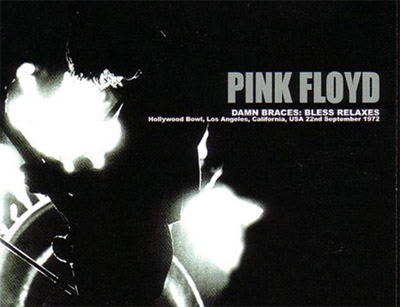Source:Wiki
 Pink Floyd are pioneers in the live music experience, renowned for their lavish stage shows that combine over-the-top visual experiences with music to create a show in which the performers themselves are almost secondary. Pink Floyd’s combination of music and visuals set the standard for rock musicians. As well as visuals, Pink Floyd set standards in sound quality with innovative use of sound effects and panning quadrophonic speaker systems. Playing 98 shows in 1972, the most until 1994, Pink Floyd debuted the live performance before its release not of a song but a whole album.
Pink Floyd are pioneers in the live music experience, renowned for their lavish stage shows that combine over-the-top visual experiences with music to create a show in which the performers themselves are almost secondary. Pink Floyd’s combination of music and visuals set the standard for rock musicians. As well as visuals, Pink Floyd set standards in sound quality with innovative use of sound effects and panning quadrophonic speaker systems. Playing 98 shows in 1972, the most until 1994, Pink Floyd debuted the live performance before its release not of a song but a whole album.
The original title was Eclipse, then Dark Side of the Moon – A Piece for Assorted Lunatics, the name under which it made its press debut in February 1972 at London’s Rainbow Theatre. The title changed for the first part of the US tour to Eclipse (A Piece for Assorted Lunatics) during April and May before reverting to Dark Side of the Moon – A Piece for Assorted Lunatics in September for the second part of the US tour and finally released in 1973 under the title of The Dark Side of the Moon.
Remarkably, at its first full live performance at Guildhall, Portsmouth, England on 21 January 1972, most of the album was in the form it would be when released 14 months later. The significant differences include:“On the Run”, whose working title was “Travel” or “The Travel Sequence”, was a guitar and drum jam and would remain so for the rest of the year’s performances. “Time” was played at a slower speed and the first half of the verses were sung by Gilmour and Wright together.
The line “Lying supine in the sunshine” was sung instead of “Tired of lying in the sunshine”. The former lyric was also sometimes used in shows after the album’s release. (pull)“The Great Gig in the Sky”, whose working title was “Religion” or “The Mortality Sequence”, consisted at the debut in January of synthesized organ and various tapes of “preachers”(/pull) either preaching or reading from such passages as from Chapter 5, Verse 13 of Ephesians, a book of the Bible, or reciting The Lord’s Prayer.
Starting in September, the music of the song as per the album was performed, without vocals. A portion of the song contained the aforementioned “preacher” tape recording of Ephesians, at much lower volume, and it was performed this way for the rest of the year. “Money” began with a longer introduction on the bass, and the saxophone solo was instead played on the electric piano.
“Us and Them” during 1972 lacked the saxophone solo as found on the album. At the debut, the song “Eclipse” was nothing more than lyric less extension of “Brain Damage” that devolved into various odd sounds. The version with lyrics and music as found on the album debuted at Bristol on 5 February. Finally, none of the spoken word pieces as found on the album were done during 1972.
One of the two shows at The Dome, Brighton, England on 28 June and 29 June was filmed by Peter Clifton for inclusion on his film Sounds of the City. Clips of these appear occasionally on television and the performance of “Careful with That Axe, Eugene” is on the various artists video Superstars in Concert. In November 1972, during the middle of the European leg of their 1972 world tour and again in January 1973, Pink Floyd performed with the Roland Petit Ballet. The set list for which their portion of the ballet was choreographed to was “One of These Days”, “Careful with That Axe, Eugene”, “Obscured by Clouds”, “When You’re In” and “Echoes”.1973 saw Pink Floyd go on two relatively short tours of the US, one in March to coincide with the release of Dark Side of the Moon and a later one in June. Sandwiched between them were two nights at London’s Earl’s Court on 18 May and 19 May where they debuted the special effect of a plane crashing into the stage at the end of the song “On the Run”.
This was also the first year that the band took additional musicians on tour with them, unlike the earlier performances of “Atom Heart Mother” where the band would often hire local musicians. Dick Parry would join Pink Floyd during Money and Us and them and a backing chorus of three or four women. Clare Torry sung backing vocals during the Robert Wyatt benefit concerts, she wouldn’t do this again until 1990 at the Knebworth Festival.
Due to the overwhelming chart success of both Dark Side of the Moon, which reached #1 in the US in late April, #2 in the UK, and the US-released single “Money”, the nature of Pink Floyd’s audiences changed in June 1973. Thay used to play at theaters and auditoriums but in this tour they played at Stadiums and large arenas.
On November 4th, 1973, Pink Floyd played two shows at London’s Rainbow Theatre to benefit musician Robert Wyatt formerly the drummer of Soft Machine, a band they’d played with in their UFO Club days. Wyatt fell from a fourth floor window in June 1973, breaking his back and making him a paraplegic. The concerts raised a reported £10,000 for Wyatt.

